Today, Oregon has one of the country's most exciting and innovative wine industry and it was great to hear that our friend Arnaud had chosen Oregon as the theme of his May wine club tasting.

View from the Aurora vineyard (Ponzi Winery)
Winemaking started in Oregon in the 1840s when Italian and Swiss immigrants began planting wine grapes. After the Prohibition, it was only in the mid-1970s that the state slowly emerged as a productive wine-growing region. Today, Oregon is a premier producer of cool-climate grape varieties including Pinot Gris, Riesling, Chardonnay, and especially Pinot noir.
Most Oregon wine regions lie in valleys between the southern Cascade Mountains and the Coastal Range to the west. The Willamette Valley, Oregon's leading wine region, has two-thirds of the state's wineries and vineyards and is home to more than 200 wineries, most of them small and family-owned.
For this tasting, Arnaud had selected a variety of wines from the Willamette Valley, three whites, two Pinot Noir wines from the challenging 2004 vintage and two from the warm 2003 vintage that he thought, would be interesting to compare.
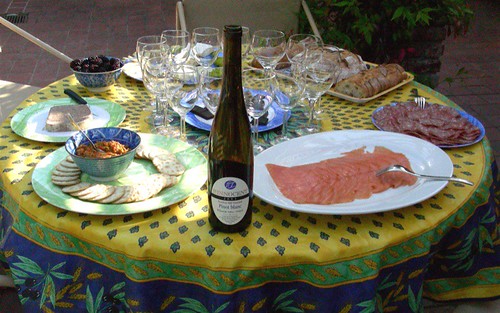
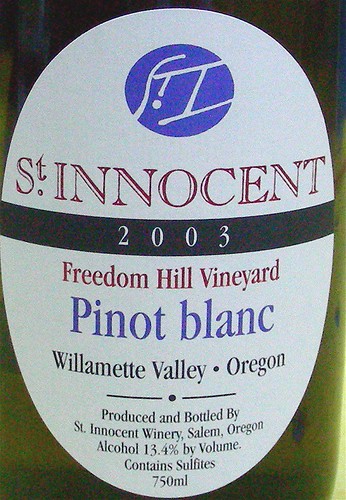 Our first white wine was a Pinot Blanc from St, Innocent Winery, a winery founded in 1988 that produces small lot wines including seven single vineyard Pinot Noir, two Chardonnay, two Pinot Gris, and one Pinot Blanc. The 2003 St. Innocent Pinot Blanc Freedom Hill Vineyard had a light yellow color, a lemony nose with mineral notes, and a dry, full-bodied palate. This is a wine that we thought should go well with Asian cuisine.
Our first white wine was a Pinot Blanc from St, Innocent Winery, a winery founded in 1988 that produces small lot wines including seven single vineyard Pinot Noir, two Chardonnay, two Pinot Gris, and one Pinot Blanc. The 2003 St. Innocent Pinot Blanc Freedom Hill Vineyard had a light yellow color, a lemony nose with mineral notes, and a dry, full-bodied palate. This is a wine that we thought should go well with Asian cuisine.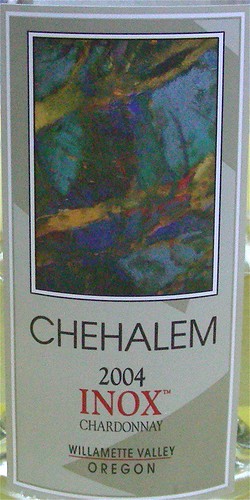 Our next wine was a Chardonnay from Chehalem Winery. Chehalem (Chuh-hay-lum) is a local Calapooia Indian word meaning gentle land or valley of flowers. The winery grows Pinot Noir, Chardonnay, Pinot Gris, Pinot Blanc, Gamay Noir, and Riesling in its estate vineyards, and crafts wines using estate fruits only. The 2004 Chehalem Inox Chardonnay Willamette Valley is entirely tank fermented, without malolactic fermentation or lees contact. INOX™ is the abbreviation of the French word acier inoxidable, which means stainless steel. I already had this wine before, and once again, I enjoyed the wine's pear and peach aromas and the crisp and fresh mouthfeel on the palate.
Our next wine was a Chardonnay from Chehalem Winery. Chehalem (Chuh-hay-lum) is a local Calapooia Indian word meaning gentle land or valley of flowers. The winery grows Pinot Noir, Chardonnay, Pinot Gris, Pinot Blanc, Gamay Noir, and Riesling in its estate vineyards, and crafts wines using estate fruits only. The 2004 Chehalem Inox Chardonnay Willamette Valley is entirely tank fermented, without malolactic fermentation or lees contact. INOX™ is the abbreviation of the French word acier inoxidable, which means stainless steel. I already had this wine before, and once again, I enjoyed the wine's pear and peach aromas and the crisp and fresh mouthfeel on the palate.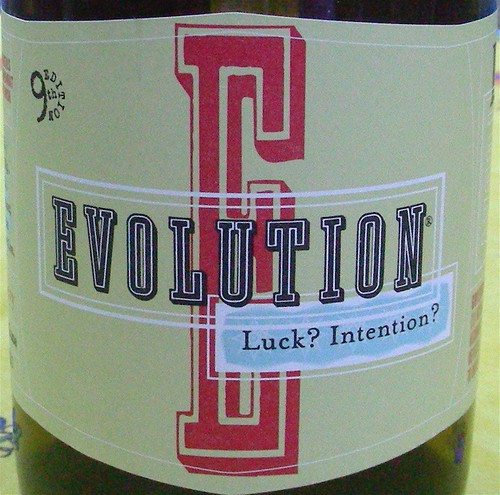 Our last white wine was the Sokol Blosser Evolution, a non vintage blend of nine different grapes, named, explained Arnaud, after the Beatles' song Revolution 9. Luck? Intention? is the question on the label, referring to the famous quote by Thomas Edison: success is 90% sweat and 10% luck. The Sokol Blosser Evolution 9th Edition was a fun wine to drink, uncomplicated but very aromatic. Light in color, it had a floral nose with white peach aromas, followed by notes of honey and exotic fruits on the palate.
Our last white wine was the Sokol Blosser Evolution, a non vintage blend of nine different grapes, named, explained Arnaud, after the Beatles' song Revolution 9. Luck? Intention? is the question on the label, referring to the famous quote by Thomas Edison: success is 90% sweat and 10% luck. The Sokol Blosser Evolution 9th Edition was a fun wine to drink, uncomplicated but very aromatic. Light in color, it had a floral nose with white peach aromas, followed by notes of honey and exotic fruits on the palate.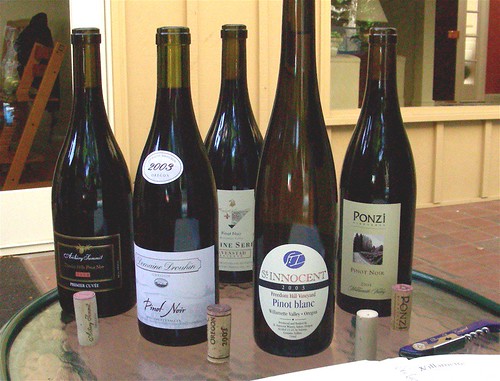
Our first two red wines were from the 2004 vintage, a challenging year in the Willamette Valley. After a harsh winter freeze, there was a spurt of warm weather in the early spring followed by some cold weather that halted the plants growth. The summer season was dry but then, a cold and wet weather period occurred in the middle of September. Finally, the season ended with sunny, cool, and breezy days that allowed the grapes to slowly finish ripening.
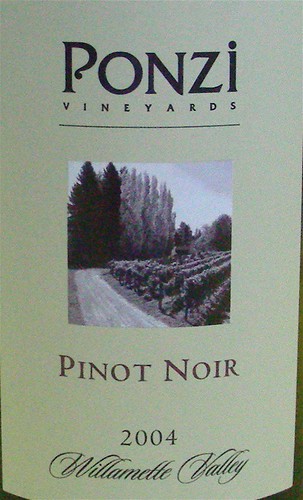 We started with a Pinot Noir from Ponzi Vineyards. Founded in 1970, Ponzi is one of Oregon's oldest and best-known winery. It offers today limited productions of Pinot Noir, Chardonnay, Pinot Gris, Pinot Blanc, Arneis, Dolcetto and White Riesling. The 2004 Ponzi Pinot Noir Willamette Valley had a vibrant ruby color, an aromatic nose of fresh cherry and some bright acidity on the palate. The wine was not overly complex but nonetheless, very satisfying and delicious.
We started with a Pinot Noir from Ponzi Vineyards. Founded in 1970, Ponzi is one of Oregon's oldest and best-known winery. It offers today limited productions of Pinot Noir, Chardonnay, Pinot Gris, Pinot Blanc, Arneis, Dolcetto and White Riesling. The 2004 Ponzi Pinot Noir Willamette Valley had a vibrant ruby color, an aromatic nose of fresh cherry and some bright acidity on the palate. The wine was not overly complex but nonetheless, very satisfying and delicious.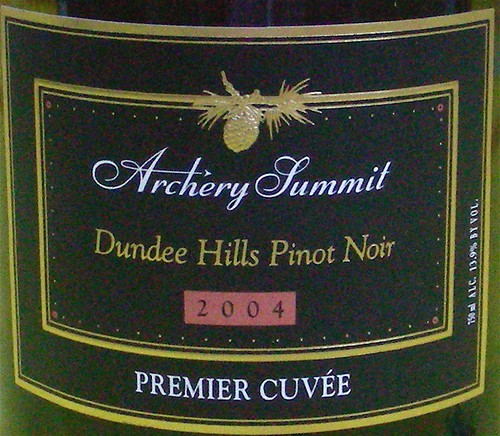 Our second Pinot was from Archery Summit, a winery founded in 1993 and dedicated to the production of distinguished Pinot Noir. Its portfolio includes single vineyard wines from the four estate vineyards: Archery Summit Estate, Red Hills Estate, Arcus Estate, and Renegade Ridge Estate, and a Premier Cuvée, which is a blend of the four vineyards. The 2004 Archery Summit Pinot Noir Premier Cuvée had a deep red color. It was woody, concentrated, with spices, cinnamon, and sweet berry flavors.
Our second Pinot was from Archery Summit, a winery founded in 1993 and dedicated to the production of distinguished Pinot Noir. Its portfolio includes single vineyard wines from the four estate vineyards: Archery Summit Estate, Red Hills Estate, Arcus Estate, and Renegade Ridge Estate, and a Premier Cuvée, which is a blend of the four vineyards. The 2004 Archery Summit Pinot Noir Premier Cuvée had a deep red color. It was woody, concentrated, with spices, cinnamon, and sweet berry flavors.Our last two wines were from the great 2003 vintage. In 2003, the year started well with warm weather in late spring that provided ideal conditions for uniform flowering. Then a warm and dry summer encouraged excellent flavor development in the grapes. Record heat in the fall led to an early harvest with unprecedented sugar levels.
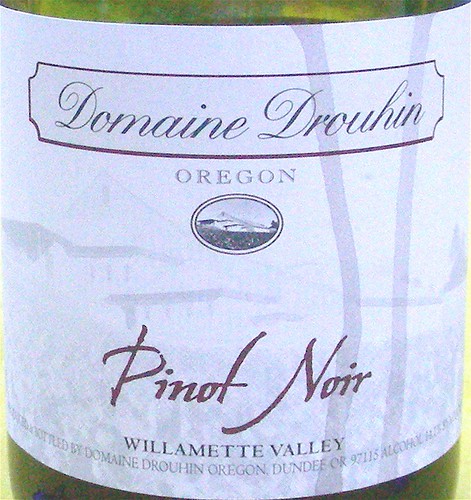 Our first 2003 Pinot Noir was from Domaine Drouhin. The story of Domaine Drouhin started in 1961 when Robert Drouhin, head of Maison Joseph Drouhin, made a visit to the west coast in order to promote the Drouhin Burgundies. Now, as Robert Drouhin was traveling throughout the western states, it was Oregon, a remote wine region at the time, not California, that caught his eyes. Finally, in 1987, more than two decades after Robert's first visit, the Drouhin family decided to purchase some land in the Red Hills of Dundee and start a winery with Robert's daughter Veronique as winemaker. Today, Domaine Drouhin has 70 acres planted with Pinot Noir, and 13.5 acres with Chardonnay in the Willamette Valley. The 2003 Domaine Drouhin Pinot Noir Willamette Valley had a dark garnet color and a nose of vanilla and berry. On the palate, it was sweet with ripe fruit flavors, a little bit too ripe and sweet for my taste.
Our first 2003 Pinot Noir was from Domaine Drouhin. The story of Domaine Drouhin started in 1961 when Robert Drouhin, head of Maison Joseph Drouhin, made a visit to the west coast in order to promote the Drouhin Burgundies. Now, as Robert Drouhin was traveling throughout the western states, it was Oregon, a remote wine region at the time, not California, that caught his eyes. Finally, in 1987, more than two decades after Robert's first visit, the Drouhin family decided to purchase some land in the Red Hills of Dundee and start a winery with Robert's daughter Veronique as winemaker. Today, Domaine Drouhin has 70 acres planted with Pinot Noir, and 13.5 acres with Chardonnay in the Willamette Valley. The 2003 Domaine Drouhin Pinot Noir Willamette Valley had a dark garnet color and a nose of vanilla and berry. On the palate, it was sweet with ripe fruit flavors, a little bit too ripe and sweet for my taste.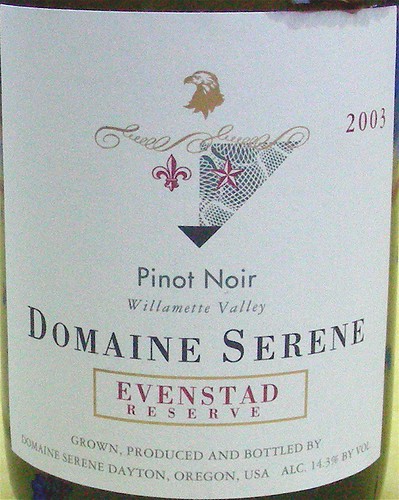 Our last wine was from Domaine Serene, a winery using meticulous vineyard practices and insisting on extremely low yields. The 2003 Domaine Serene Pinot Noir Evenstad Reserve Willamette Valley had a dark garnet color and a vivid cherry nose. On the palate, it had some good acidity and complex fruit and spice flavors followed by a well balanced finish. I had this wine before as part of another tasting and I was glad to have the opportunity to retaste it. Overall, the wine was the most complex and balanced wine of the selection and ended up being everybody's favorite.
Our last wine was from Domaine Serene, a winery using meticulous vineyard practices and insisting on extremely low yields. The 2003 Domaine Serene Pinot Noir Evenstad Reserve Willamette Valley had a dark garnet color and a vivid cherry nose. On the palate, it had some good acidity and complex fruit and spice flavors followed by a well balanced finish. I had this wine before as part of another tasting and I was glad to have the opportunity to retaste it. Overall, the wine was the most complex and balanced wine of the selection and ended up being everybody's favorite.Many thanks to Arnaud for selecting these superb wines and also to our friendly hosts Sabrina and Marty for sharing their beautiful house!
Technorati tags: wine food & drink
No comments:
Post a Comment